To one side of the encampment, and conspicuously apart from it, stood a second camp of two tents. But it was a white man’s camp. If nothing else, the choice of position at least bore convincing evidence of this. In case of offence, it commanded the Indian quarters a hundred yards away; of defence, a rise to the ground and the cleared intervening space; and last, of defeat, the swift slope of a score of yards to the canoes below. From one of the tents came the petulant cry of a sick child and the crooning song of a mother. In the open, over the smouldering embers of a fire, two men held talk.
“Eh? I love the church like a good son. Bien! So great a love that my days have been spent in fleeing away from her, and my nights in dreaming dreams of reckoning. Look you!” The half-breed’s voice rose to an angry snarl. “I am Red River born. My father was white—as white as you. But you are Yankee, and he was British bred, and a gentleman’s son. And my mother was the daughter of a chief, and I was a man. Ay, and one had to look the second time to see what manner of blood ran in my veins; for I lived with the whites, and was one of them, and my father’s heart beat in me. It happened there was a maiden—white—who looked on me with kind eyes. Her father had much land and many horses; also he was a big man among his people, and his blood was the blood of the French. He said the girl knew not her own mind, and talked overmuch with her, and became wroth that such things should be.
“But she knew her mind, for we came quick before the priest. And quicker had come her father, with lying words, false promises, I know not what; so that the priest stiffened his neck and would not make us that we might live one with the other. As at the beginning it was the church which would not bless my birth, so now it was the church which refused me marriage and put the blood of men upon my hands. Bien! Thus have I cause to love the church. So I struck the priest on his woman’s mouth, and we took swift horses, the girl and I, to Fort Pierre, where was a minister of good heart. But hot on our trail was her father, and brothers, and other men he had gathered to him. And we fought, our horses on the run, till I emptied three saddles and the rest drew off and went on to Fort Pierre. Then we took east, the girl and I, to the hills and forests, and we lived one with the other, and we were not married,—the work of the good church which I love like a son.
“But mark you, for this is the strangeness of woman, the way of which no man may understand. One of the saddles I emptied was that of her father’s, and the hoofs of those who came behind had pounded him into the earth. This we saw, the girl and I, and this I had forgot had she not remembered. And in the quiet of the evening, after the day’s hunt were done, it came between us, and in the silence of the night when we lay beneath the stars and should have been one. It was there always. She never spoke, but it sat by our fire and held us ever apart. She tried to put it aside, but at such times it would rise up till I could read it in the look of her eyes, in the very intake of her breath.




